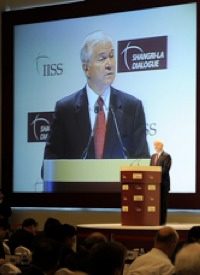
"I know some in Asia have concluded that Afghanistan does not represent a strategic threat for their countries, owing in part to Afghanistan’s geographic location," Gates told the summit, also complaining about the level of NATO countries’ commitments. "But the threat from failed or failing states is international in scope — whether in the security, economic or ideological realms."
Echoing rhetoric from other representatives regarding the need for closer international cooperation, Gates explained, "The challenge in Afghanistan is so complex and so untraditional that it can only be met by all of us working in concert." Despite the nation’s poverty — among the poorest in the world — Gates said it had potential and that before its many years of war Afghanistan was actually an agriculture exporter. He added that Afghanistan’s security would depend on building strong military and police forces, which the United States is spending vast amounts of resources on.
Afghanistan will hold elections in August of this year that will “be seen as the key test of progress,” according to diplomats cited in a Reuters article titled "U.S. urges more foreign aid for Afghanistan." “Success or failure of the polls will override any other events there this year,” the story said. The U.S. military, hoping to turn the tide on recent gains made by the Taliban, is in the process of adding 20,000 more troops to the 40-nation force already there.
Gates also said the United States would provide military aid and training to Pakistani forces in their battle against militants, but stopped short of pledging U.S. ground troops. "We are very sensitive to Pakistan’s sovereignty and eager to be helpful, but only as the Pakistanis want us to be helpful," he told the summit, praising Pakistan’s efforts so far. He also called the Taliban an “existential threat” to the country.
The summit opened with a speech by Australian Prime Minister Kevin Rudd, who said, "Much of the critical history of the 21st century will be written, shaped and lived out here in Asia-Pacific." Commenting on China’s role, deputy chief of staff Ma Xiaotian of the People’s Liberation Army, said, "As a responsible major country, China has been playing an important role in maintaining Asia-Pacific peace and stability, making its due contribution in the process."
Another important topic discussed at the summit was the recent nuclear test by North Korea, which China, the United States, and other Asian nations roundly condemned. That incident too was used to promote closer “international cooperation.” According to an article by Xinhua, a Chinese news agency, representatives agreed that “it is imperative to build a robust regional framework that could address various security challenges” and that “in a globalizing world today, traditional and non-traditional security threats are interwoven and beyond state boundaries, and these global security challenges place a greater reliance on cooperative solutions.”
The annual summit is organized by the London International Institute for Strategic Studies. It is designed to bring together military, legislative, and security representatives from various countries to discuss “regional security issues.”
While some of the threats addressed at the summit are real indeed, the solution is not to further integrate the world’s militaries or to further extend America’s armed forces. The last thing the United States needs is a war with Pakistan or closer cooperation with communist armed forces. Instead, America should pursue the foreign policy advocated by its Founders — peace and commerce.



